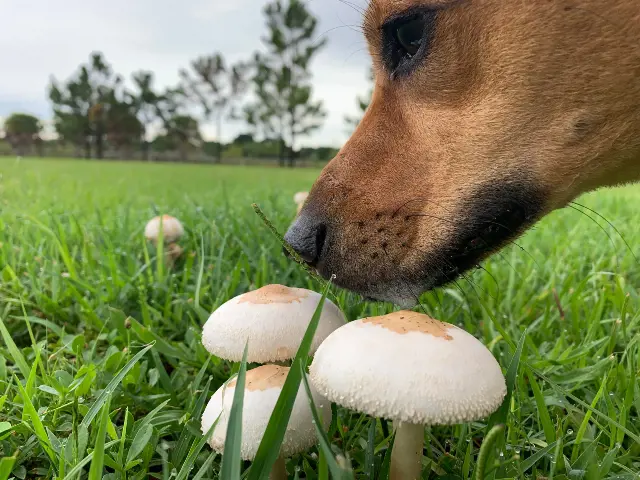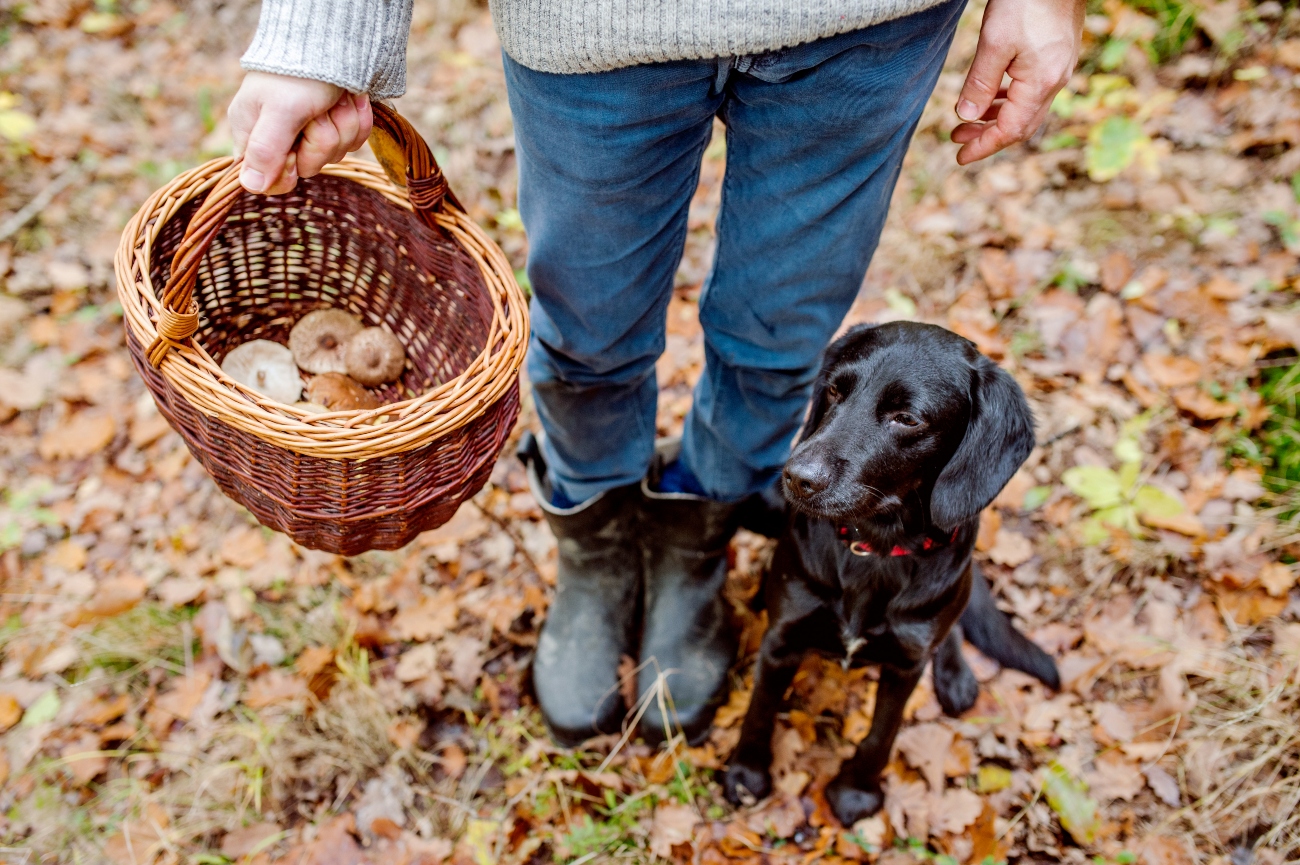Mushroom poisoning in dogs and how to prevent it
14th August, 2023

As a loving dog owner, you want to ensure your furry friend stays safe and healthy. Though some mushrooms may be harmless or even beneficial to humans, there are many toxic varieties that can pose a serious risk to your dog's health.
Mushroom poisoning in dogs, also known as mycotoxicosis, occurs when a dog ingests toxic mushrooms. This type of poisoning is more common than you might think, and it's essential to be aware of the dangers these fungi can pose to your pet.
Mushroom poisoning in dogs is a concern worldwide, but certain regions like the UK have a higher prevalence of toxic mushrooms.
In this article, you will learn about common toxic mushrooms found in the UK, the symptoms of mushroom toxicity in dogs, and what to do if your dog ingests a poisonous mushroom.
You will also discover preventative measures to help protect your pet from mushroom poisoning, as well as tips for educating yourself and others about the dangers of toxic mushrooms.
By educating yourself on this critical topic, you can help prevent mushroom poisoning in dogs and keep your beloved pet safe from harm.
Common toxic mushrooms found in the UK
In the UK, there are many mushrooms that can be harmful to dogs.
Some of the most common mushrooms varieties found in the UK that are toxic are:
1. Amanita phalloides
Also known as Death Cap, this is highly toxic and one of the deadliest mushrooms for humans and dogs. It contains amatoxins, which can cause kidney and liver failure, or in some cases, even death.
2. Amanita muscaria
Commonly known as Fly Agaric, this brightly coloured red and white mushroom contains ibotenic acid and muscimol, which can cause hallucinations, vomiting, and seizures in dogs.
3. Galerina marginata
Known as the Funeral Bell, this mushroom contains the same deadly amatoxins as the Death Cap and can cause severe liver and kidney failure in dogs.
4. Inocybe spp. and Clitocybe spp.
These mushrooms contain the toxin muscarine, which can cause excessive salivation, vomiting, and diarrhoea in dogs.
It's important to remember that even edible mushrooms for humans can be toxic to dogs.
Therefore, it's best to prevent your pet from consuming any mushrooms they encounter outdoors.
Symptoms of mushroom poisoning in dogs
Mushroom toxicity in dogs can present with a wide range of symptoms, depending on the specific mushroom ingested.
Some initial symptoms of a poisoned dog include:
Vomiting
- Diarrhoea
- Abdominal pain
- Excessive drooling
- Weakness
- Lethargy
- Loss of coordination
- Tremors
- Seizures
- Coma
In severe cases, dogs may experience kidney and liver failure, which can be fatal if not treated promptly.
It's advised to monitor your dog closely if you suspect they have ingested poisonous mushrooms and seek veterinary assistance immediately.
What to do if your pet ate mushrooms that might be toxic
If you believe your dog has ingested a toxic mushroom, it's best to act quickly.
Take the following steps to help your pet:
- Remove any remaining mushroom fragments from your dog's mouth, being careful not to get bitten.
- If possible, take a photo or collect a sample of the mushroom your dog ate for identification.
- Contact your veterinarian or an emergency vet clinic immediately for advice. They may instruct you to induce vomiting or bring your dog in for treatment.
- Keep a close eye on your dog and monitor their symptoms until you can get them to a veterinarian.
- Early intervention and getting them treated quickly can greatly improve your pet's chances of survival when it comes to mushroom toxins.
Diagnosing mushroom poisoning in dogs
When you bring your dog to the veterinarian, they will ask about your pet's history and any potential exposure to mushroom toxins.
If you have a photo or sample of the mushroom your dog ate, this can be helpful for identification and determining the appropriate treatment.
Your veterinarian may perform a physical examination, blood tests, urinalysis, and imaging studies such as X-rays or ultrasounds to assess your dog's liver and kidney function.
These tests can help confirm a diagnosis of mushroom poisoning and determine the severity of the toxicity.
Treatment options for mushroom ingestion in dogs
The treatment for mushroom poisoning in dogs depends on the type of mushroom ingested and the severity of the symptoms.
In some cases, your veterinarian may induce vomiting or administer activated charcoal to help absorb the toxins. Intravenous fluids and medications may be provided to support your dog's liver and kidney function and treat neurological signs such as seizures or tremors.
In severe cases, dogs may require hospitalisation and intensive care, including:
- Oxygen therapy
- Blood transfusions
- Dialysis
- Prognosis and recovery from mushroom poisoning
The prognosis for most dogs with mushroom poisoning depends on several factors, including the mushroom type, the amount consumed, and the promptness of treatment.
In some cases, dogs can make a full recovery with timely and appropriate treatment. However, in severe cases or if treatment is delayed, mushroom poisoning can be fatal.
During your dog's recovery, it's advised to follow your veterinarian's instructions and keep a close eye on your pet for any changes in their condition.
Regular follow-up appointments may be necessary to monitor your dog's liver and kidney function and ensure a successful recovery.
When to seek professional help for suspected mushroom poisoning in dogs
If you suspect a possible mushroom ingestion, it's advised to seek professional help.
Do not attempt to treat your dog at home or wait for symptoms to worsen before contacting your veterinarian. Early intervention is helpful in improving your pet's chances of survival and reducing the risk of long-term complications from mushroom poisoning.
Tips for identifying and removing poisonous mushrooms from your property

To protect your dog from mushroom poisoning, it's helpful to regularly inspect your property and remove any potentially toxic mushrooms.
Here are some tips for identifying and removing dangerous mushroom species:
- Learn to identify common wild mushrooms in your area, using resources such as field guides or online databases.
- Regularly inspect your garden, yard, or any outdoor areas your dog has access to for the presence of mushrooms.
- If you find a potentially toxic mushroom varieties, remove it carefully, wearing gloves, and dispose of it in a sealed bag to prevent your dog from accessing it.
- Consider fencing off areas where wild mushrooms are prevalent to keep your dog away.
Tips for preventing mushroom poisoning in dogs
In addition to identifying and removing poisonous mushrooms from your property, there are several other steps you can take to prevent mushroom poisoning in dogs:
- Keep your dog on a leash during walks, especially in wooded areas or fields where wild mushrooms may be present.
- Supervise your dog closely when outdoors and redirect them if they show interest in mushrooms.
- Train your dog to "leave it" or "drop it" on command, which can be helpful if they pick up a toxic mushroom.
- Educate family members and pet sitters about the dangers of mushroom poisoning in dogs and the importance of preventing access to toxic mushrooms.
Educating yourself and others about toxic mushrooms
Knowledge is power when it comes to preventing mushroom poisoning in dogs.
By educating yourself about different mushroom species and their dangers, you can help protect your pet and others in your community.
Share information about toxic mushrooms with friends, family, and neighbours, and consider joining local pet owner groups or online forums to raise awareness and share resources.
Check out our article discussing what other vegetables can dogs not eat to learn more about what is safe for your pet to taste.
Conclusion and resources for further information
Mushroom poisoning in dogs is a serious concern that requires vigilance and prompt action to prevent and treat.
By educating yourself about toxic mushrooms, practicing mushroom identification, regularly inspecting your property, and taking preventative measures, you can help keep your beloved furry friend safe and healthy.
For more information on toxic mushrooms and mushroom poisoning in dogs, consider consulting your veterinarian or local pet clinics, as well as reputable online resources like the Pet Poison Helpline or the Animal Poison Control Centre.
To get a pet insurance quote for your furry friend, you can get a quote through our website by clicking here. If you would like to talk to one of our pet insurance team, you can get in touch with us on 0330 102 5748.
Helpful Pages
Recent Posts
Pet Insurance Quote
- 98% claims paid *
- Claims paid directly to vets
- 24/7 vet video consultations
- Interest free monthly payments




